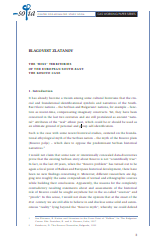NARRATING »THE PEOPLE« AND »DISCIPLINING« THE FOLK The Constitution of the Hungarian Ethnographic Discipline and the Touristic Movements (1870–1900)
NARRATING »THE PEOPLE« AND »DISCIPLINING« THE FOLK The Constitution of the Hungarian Ethnographic Discipline and the Touristic Movements (1870–1900)
Author(s): Levente T. Szabó
Subject(s): Human Geography, Period(s) of Nation Building
Published by: Centre for Advanced Study Sofia (CAS)
Keywords: Hungarian nation-building;
Summary/Abstract: Preparadigmatic and early paradigmatic ethnographic imagination and practice played a crucial role in mid- and late 19th-century Hungarian nationbuilding. Different versions of national identity competed within the new discipline called ethnography. They used, translated, transformed, and remade the emerging discipline. In order to map these transformations, I will focus both on the ideological transfers and on the internal cleavages to simultaneously see the sources, and the reception of texts and phenomena that are used in the crossings and interactions of this disciplinary formation. At the same time, this train of thought is also a broad history of the early (preparadigmatic and early disciplinary) phases of Hungarian ethnography. As such, it will try to follow the history of the professionalization and „disciplinarization“ of ethnography along several shifts: from the mainly textual interest of Hungarian ethnography of the 1840s-1860s to the „visual turn“ and exhibition of folk objects of the 1870s, and to the complex interaction of the phenomena of tourism and ethnography in the last two decades of the 19th century. In following these shifts, it will attempt to understand and analyze how the emergence of this new discipline coincided with the rise of the nation-building process of modernity, and what were the consequences of their complex and multi-layered relationship.
Series: CAS Sofia Working Papers
- Page Count: 27
- Publication Year: 2011
- Language: English
- Content File-PDF

